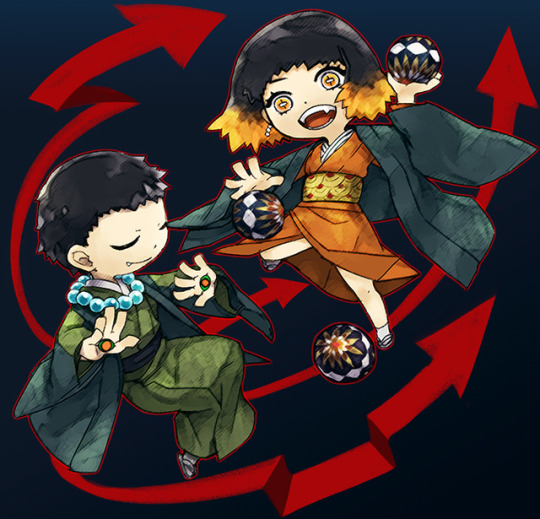#朱紗丸
Video
youtube
鬼滅の刃ヒノカミ血風譚ハイライト6、矢琶羽&朱紗丸戦
#youtube#NintendoSwitch 鬼滅の刃 DEMONSLAYER BOSS ハイライト 矢琶羽 朱紗丸 鬼滅の刃ヒノカミ血風譚6章までのハイライトシーンをまとめてみました。 今回は3章の終盤、矢琶羽&朱紗丸戦です!
0 notes
Text
reading demon slayer: chapter 16 name breakdown
the last chapter of volume 2 has 2 names--how fitting. i don't believe the other demons that tanjirou has fought up to this point have had names, so this is a special occasion!
first we are given the name of the male demon,
矢琶羽
read as やはば. 矢 (や) means arrow, obviously a nod to yahaba's blood demon art. 琶 (は) is mostly found in words relating to the 琵琶 (びわ), which is a type of japanese string instrument. i think the inclusion of this kanji is a reference to the 琵琶法師 (びわほうし) of old. they were street performers, often blind, who played the biwa and recited poetry to make money. they also frequently dressed in buddhist garb.
yahaba isn't blind, per se, since his eyes are usually just on his hands, but he certainly looks the part. and his chunky necklace reminds me of buddhist mala, or prayer beads. many websites say yahaba's necklace is just a pearl necklace. however, i have not found a source to back up that claim, so i think i can speculate here.
i will note that mala usually have 108 beads, and yahaba's necklace is never pictured with more than 10 beads. but sometimes mala can be smaller. these smaller versions typically use factors of 108 as the total number of beads, and a factor of 108 is 12. with this knowledge i believe it is safe to assume that yahaba's necklace is meant to have 12 beads (perhaps plus one more, the mother bead) and the remaining beads are simply not drawn because they are obscured by his neck.
a 12-bead necklace would also be symbolic of the twelve demon moons, of which yahaba and susamaru claim to be members. if there is indeed a 13th mother bead, that could symbolise kibutsuji himself, as the father of all demons. but i digress.
the third character in yahaba's name, 羽 (ば), can mean feather or wing. it is also used as a counter for certain small animals (e.g. birds and rabbits). when paired with 矢, as in 矢羽 (やばね), we get a word meaning arrow feathers. this is probably the reference the author intended to make.
unfortunately yahaba's name doesn't make a neat sentence or phrase, but it does convey his powers and has a historical reference, so that's cool too.
after yahaba, we are given the name of the female demon,
朱紗丸
read as すさまる. you might already recognize the third kanji, but hold on! we'll get there in a minute. the first character 朱 (す) generally means red. it can specifically refer to a cinnabar, vermilion, or scarlet color. susamaru's orange eyes, kimono, and red-orange tipped hair reflect this part of her name.
紗 (さ) means silk gauze, and shows up in words regarding delicate fabrics like silk or gauze. it is also used as ateji in words about thicker fabrics like felt, chintz, and wool. 丸 (まる) means circle. if you recognized it from the start, nice! traditional temari are said to be made of fabric scraps from kimono and other household items, so a temari could be thought of as a fabric ball--a 紗丸.
that means susamaru's name is literally scarlet fabric ball. and i mean, her temari do have red on them. her and yahaba's names are very similar in that they both allude to their powers and parts of their designs. i expect we'll see this pattern repeated in the naming of future demons, but i may be surprised.
i believe that's all for this chapter's name breakdown! i especially enjoyed researching and writing the part about yahaba's necklace. i hope you did too. thanks for reading, and please look forward to the next posts! 読んでくれてありがとう!次の投稿を楽しみにしてください!
3 notes
·
View notes
Note
Hello hello, Senpai!! How are you doing? I hope everything is going well for you! ^^ <3
I just have one question for you (though it might be a bit long for you to answer, so I apologize in advance 😅): could you please analyze the names of all my babies the Lower Moons (+ Kyōgai)? I tried doing that myself to potentially find out more about their powers or what the origin of their namesake is, but since I'm still a beginner in Japanese and I don't have/know of that many resources yet, I felt like asking you would be the best option.
We don't know anything about the Lower Moons that Muzan himself killed, except for their appearance, their names, and their order in the Lower ranks, but despite this I grew attached to them (especially Mukago 💝) and would like to be able to bring more love and attention to them in the fandom. Because everyone always talks about the Upper Moons and they forget about my poor children in the Lower ranks 💔
I'm sorry for the lengthy ask, I got a bit carried away 😅 But thank you in advance if you decide to answer this!! Take all the time you need with this and all your other asks, and I hope you have a wonderful day/night!! 💖
I feel like Muzan would follow that old meme and be like, “I love all my Lower Moons,” and check the handwritten notes in his palm and just be like, “…Rui.”
But let’s do it! Let’s give each of these Lower Moons, as well as some honorable mentions (we love you, Kyougaaaaiiii) some love and dive into their names!
Yahaba: 矢琶羽 Dart-Lute-Feathers, I love how catchy this name is (with 矢 clearly being the operative “arrow” meaning, though I wonder if Nakime dislikes him edging in on her lute thing). It often goes forgotten that Yahaba had tastes for staying clean and tidy, which goes to show that the demons were all possessed of their own complex personalities and had richly detailed lives of their own before those demon hunters came in and chopped their heads off. Like how he and Susamaru chatted and became friends while on the way to finding the boy with the Hanafuda earrings? That’s adorable. Also, in Kimetsu Academy, he famous runs a tofu shop and I love tofu so I hope his family’s business is going well. It’s so innocuous and I feel like the innocuous sides of Yahaba should be appreciated.
Susamaru: 朱紗丸 Vermilion-Gauze-Round/Ball, another catchy and wonderful collection of good name kanji. The color reference starts her off with name full of vitality without crossing quite into the glowing reds associated with Red Blades. That 紗 is one that does get used in real life as a gentle complement to rest of the name when parents are looking for a ‘sa’ sound with an auspicious number of strokes to write it (though it’s the stroke order of the entire name typically taken into account), but concluding a name with 丸has distinctly old-timey masculine feel to it. As she presents very feminine, even on the hot edge of Taisho fashion, I love the juxtaposition. That said, in Kimetsu Academy, Susa become her very refreshing sounding last name while 丸 becomes a very cute, feminine personal name when left on its own. It’s also cute because it's the part of her name that has the most personal significance for her, as when she was a human, her father bought a toy ball for her and it remained important to her when she was a demon.
Kyougai: 響凱 Sound/Reverberation-Victory Song. A name that big goes to show how high Muzan’s hopes were for you, Kyougai! And seeing as he was inspired by the epic “Satomi Hakken-den,” Kyougai wanted to write a story that was just as big, with expansive world-building and deep allegory. That being said, Kyougai was totally more of a sensitive Hans Christian Andersen at heart, huh? Being so absorbed in his idealistic dreams for his literature, Kyougai even used a literary personal pronoun often reserved for written form (Literature, gotta be one of my favorite genders), and with his perpetual pouty-face, I can totally see him laying face down in a more successful demon’s yard to cry about how Muzan only likes him for his drum skills instead of his writing skills. (That demon was probably Nakime, and she was probably just as peeved as Charles Dickens.) Kyougai is so sensitive and deep in his literary fantasies that he was ultimately defeated by how moved he was by the literary symbolism of Tanjirou avoiding stepping on his written works, a kind demon slayer who takes heads because he must but will not trample on a demon’s heart. Also, might I say how sad it is that he’s the music teacher in Kimetsu Academy, probably because he still can’t make it as an author!? Kyoooouggaaaaaiiiii!!
Nakime: 鳴女 Sound (anything from an echo to birds chirping to a ringing noise to a honk)-Woman, doesn’t seem very creative on the surface because clearly she is a woman who works with sound (and is clearly more talented at it that Kyougai, get wrecked, is what she’d probably say to him if she bothered saying any more than necessary to the other demons). Muzan might had thought he was clever for this one, though, because ‘me’ is also the same sound as ‘eye’ (目). Maybe he even called her that at first, until she gave him stone-silent response, so instead of being embarrassed for being overly basic he chose to say it was written with the character 女 instead, because duh, she’s a woman. The name had nothing to do with her face.
EDIT: HOLD IT, WAIT UP. @lalunaticscribe rightly pointed out that this was the name a pheasant in Shinto mythology, which totally forgot about. Although it can be writing in different ways for "crying out woman," this was a messenger sent by the heavens to Amewakahiko, who was supposed to be doing the heavens' bidding but had put them on read, essentially. The pheasant was supposed to check up on him, and he literally shot the messenger with an arrow. The arrow went all the way to the heavens, the heavens were alarmed, but still wanted to give Amewakahiko the benefit of the doubt, so they threw it back saying, "well, if he's guilty, it'll strike him, if not, it'll miss" and it struck him and he died.
Hairou: 佩狼 Wear (a sword)-Wolf. Muzan must had known he was a Shinsengumi, as they were called the ‘Wolves of Mibu’ (an area of Kyoto they policed). Hairou had a complicated relationship with swords and how ultimately they lost out to more powerful guns, which he relies on after that. He can’t totally forget his affection for swords, though, as the Taisho Secrets Hirano-sensei wrote into the Rengoku Gaiden state that he collects things like handguards from defeated enemies’ swords. Tokens of his victories, nothing more!! He doesn’t admire swords, okay, he’s fine with guns!! Gunpowder is way more effective that silly swords! Nevermind that his name still implies he’d wear one!
Kamanue: 釜鵺 Iron Pot/Kettle-Nue (a Chimera sort of ghastly beast). Given that name, fresh new Lower-Moon-Six might have had the most interesting potential for a stand-off with Kamado Tanjirou, as the hearth (kamado 竈) and iron pot/kettle heated over it (kama 釜) are closely associated. Perhaps he could had been yet another character foil to Tanjirou, another former humans with family ties to working with fire and heat? If he had those orange streaks at the ends of his hair as a human, could he also had been a Kakushaku-no-Ko, but not auspicious ever happened to him and he was forced to take the path of a demon? What’s even more interesting is the ‘Nue’ part of his name, as these were fantastical creatures who plagued the nobles of Kyoto, cursing them with illness by their presence and requiring Heian era demons slayers to go hunt them down. It’s classic and I would had loved to see how that might play into Blood Technique. Was he a shape-shifter, perhaps?
Rui: 累 Continuity/Involvement. This was a name given to him by his parents, who probably wished to keep a healthy baby boy involved in their lives for a very long time. Ouch.
Mukago: 零余子 Nothing-Surplus-Child. Mukago really does leave the most impact for her character design, doesn’t she? It’s the classy symmetrical horns that do it for me, but it’s the feather/fur boa that totally seals the deal. As Muzan called her out for always avoiding strong demon hunters, I get the sense she could be pretty wily with who she choose to target or how she chose to slip away. As for this name, though, the jarring juxtaposition makes me think she’d have had very strange and unusual Blood Techniques, perhaps flirting with the divide between ‘existence’ and ‘non-existence.’ I have no idea how that would work, and her victims probably all regretting finding out.
Wakuraba: 病葉 Sick-Leaves. This one makes me curious, as Muzan probably didn’t like associations with illness. However, taken as a whole, perhaps it was in reference to blight. Were his abilities something that could spread and kill a large number of people in a given area, or did his Blood Technique spread through trees to slowly poison people through the water or attack directly with poison leaves and an evil root system throughout the forest (I wrote that into a fanfic, haaa)? He’s got a pretty unassuming appearance, wearing a kimono pattern used a few times throughout the manga, and only one simple scarf for accessory, but the scars on his face keep him from being able to blend into a crowd. How’d you get those scars, man? What is your story? Did they remain from your human life, something that no amount of demon regeneration can ever erase from you?
Rokuro: 轆轤 Potter’s Wheel/Pulley. Now this is an assuming character design. That’s totally a craftsman’s attire for working in his studio, crouched over a spinning pottery wheel all day. What was your Blood Technique, sir? Did it astound victims for how they never would have suspected you of anything, much less noticed you? Is it like a spinning mechanism, full of potential for a truly horrendous death, or do you trap victims under giant interdimensional tea cups? Does Gyokko hate you for this and want you to stop stealing his shtick? Also, the facial hair makes me think he was a Meiji era human, as it was back in style then. That would make him not a terribly old demon, at his oldest, a bit younger than Hairou (whom he replaced as Lower Moon Two) and the Hand Demon.
Enmu: 魘夢 (To have a) Nightmare-Dream. Muzan wasn’t feeling very creative that night but it does have a nice ring to it. Had he been promoted to an Upper Moon role like he hoped, maybe a name change would had been in order, like “The Enmu Express.”
And good luck with your studies! While a language cannot be learned with dictionaries alone as all languages are contextual (Japanese especially), I do use a collection of different dictionaries when I do translations (even if they pull from similar sources), as they may present slightly different nuances or methods of look-up or examples.
ALC (aimed at Japanese speakers, extensive specialized vocab and examples, albeit not well explained)
Tangorin (my favorite for overall user-friendliness)
Weblio (aimed at Japanese speakers, has more of a human touch than some of ALC's weird examples)WWWJDIC (the handwriting tool usually works well)
JapanDict (when Tangorin fails me due to slow loading)
#yahaba#susamaru#kyogai#nakime#hairou#kamanue#rui#mukago#wakuraba#rokuro#enmu#kny nerdery#kny fandom theories and meta
79 notes
·
View notes
Photo
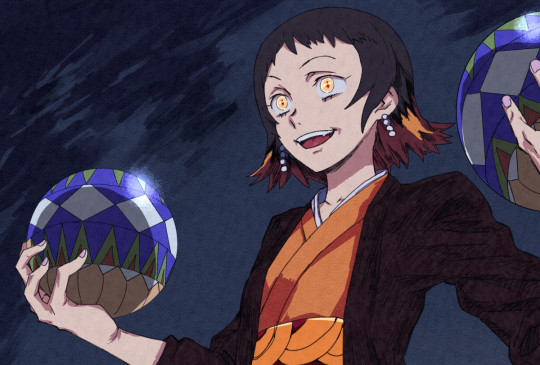
手毬鬼/朱紗丸
22 notes
·
View notes
Photo
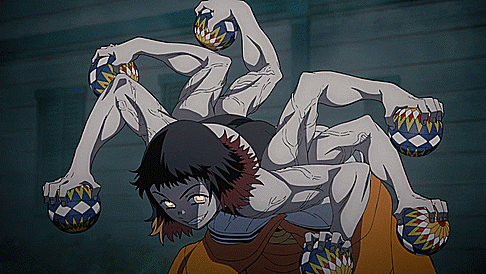
Susamaru launching her attack.
#anime#gif#character#susamaru#kimetsu no yaiba#demon slayer#demon girl#musclegirl#muscle girl#muscular female#鬼滅の刃#朱紗丸#筋肉娘#筋肉女子#筋肉美女#ufotable
275 notes
·
View notes
Photo
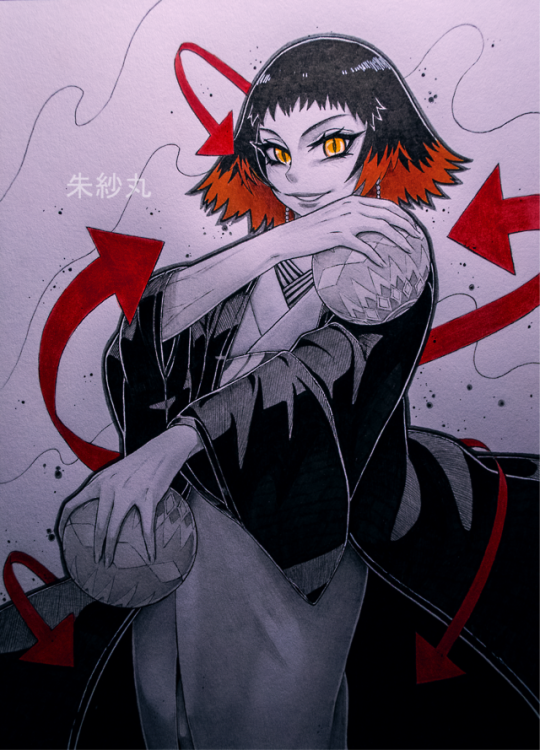
Susamaru
Artline/ Pencil/ Copic
[Requested]
Temari demon Susamaru from Kimetsu no Yaiba
#boombza#traditional#traditional art#illustration#art#myart#drawings#artist on tumblr#sketches#anime#fanart#kimetsu no yaiba#susamaru#朱紗丸#ink#artline#copic#pencil
70 notes
·
View notes
Photo
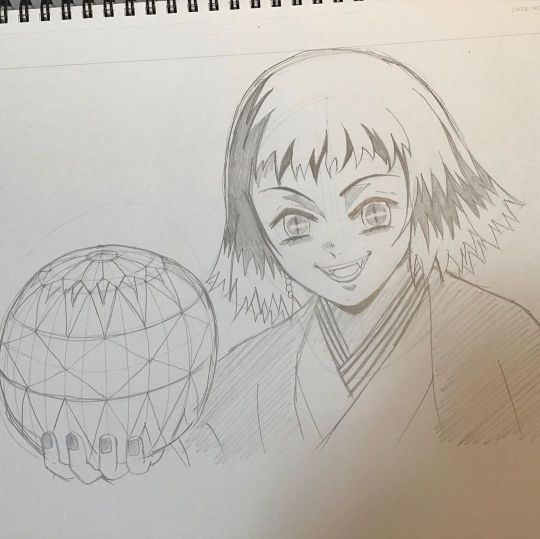
鬼滅の刃 朱紗丸を練習! 徐々に手が走ってきた感じがしているので、私の実力を考えたらよく描けたでしょう!w ところで、毬の柄とか描く時って、皆さんどうやって描いてます? #鬼滅の刃イラスト #朱紗丸 #DemonSlayer #イラスト #絵 #描いてみた #アニメ #animefans #draw #anime #manga #instafashion #otaku #animedrawing #demonslayer #kamadotanjirou #followme #絵描きさんと繋がりたい #イラストメイキング https://www.instagram.com/p/CBvB9npgBT2/?igshid=1nid7bemawrxr
#鬼滅の刃イラスト#朱紗丸#demonslayer#イラスト#絵#描いてみた#アニメ#animefans#draw#anime#manga#instafashion#otaku#animedrawing#kamadotanjirou#followme#絵描きさんと繋がりたい#イラストメイキング
0 notes
Text
十二
KIMETSU NO YAIBA - 12
22 kisses.
社團活動結束;才踏出弓道場卻立刻遭受埋伏……!?
一顆排球急速迎面而來、猛烈擦身而過──縱使他知道她並非蓄意加害,可是這次當真差點出錯──唉、怎麼仍然不懂得如何確切掌握?
「幾乎就弄髒了我的臉頰。」皮肉略為發麻,尚且觸感著殘存的風壓。唉、無奈……:「只有蠻力,準度實在悽慘得可以。」
「啊哈哈!教練也說過了一模一樣的話!」開懷大笑,接著又是力邀:「不是一直都拜託你過來打排球嗎?成為我的二傳手吧?」
「癡心妄想。」幾句對話令人乏力?嘆息:「我可是弓道部的部長。」況且、真正的難處並不僅是運動項目的差別或者頭銜連帶的職責與地位的棄捨……
「我也是排球隊的隊長!」陳述事實的方式就是態度大大方方、颯爽、開朗。
「……女子排球隊的隊長。」不是補充說明,而是提醒:「都要頭疼。妳到底有沒有意識到我是個男生?」撈起腳邊的排球,卻發現附著球體表面的塵土也沾黏了他的指頭、嘖!立刻顯露厭惡!
「哈哈、當然有啊!就算小羽神經質又公主病,你仍然還是相當帥氣又充滿魅力的男生。」上前、兜個半圈、繞到他的身邊……順勢又欣賞了一遍──嗯嗯、不愧就是她好喜歡好喜歡好喜歡的人。
「愛乾淨不等於公主病。」直接歸還排球,嘗試拒絕她的拉拉摟摟……未果。她分明那麼纖細,又並非三頭六臂,竟然如此怪力!?「放手。制服會變皺。」逼迫自己去思考摺痕或者汙垢、勉強自己不在意被擁抱的感受……阿丸既難纏又麻煩,卻很溫暖也好柔軟。
「來不及了。已經皺巴巴的。」就更加理所當然地與他指掌交扣、拉手,以臉頰去磨蹭他的指尖與關節、以嘴唇去碰觸他的手背與腕臂……:「實在太可惜了。」倒不是非得要自己的男朋友擔任個人專屬的二傳手,反而是莫名期望能夠立足於相同的競技賽場、彼此的身旁──為了一致的目標而一起奮鬥、成長?
「的確太可惜了。」被搞亂的襯衫衣袖、受動搖的處事步驟……微笑、內心自我解嘲──與她相比,潔癖與意志力……根本不值得提及──有關於自身與其他人的任何要求,反而更加在意她的感受、哈啊、放縱為所欲為也並非安慰:「不過倒是沒有必要傷心,反正一直都陪伴著進行私下額外的魔鬼特訓。」
「嗯嗯、」靠近、抱緊──不愧就是她好喜歡好喜歡好喜歡的人。
ashes ×
D20K22 - 12:「腕(手臂)」。
矢琶羽與朱紗丸。
學園少男少女。
第二次嘗試這個配對。沿用自己先前於〈繡球〉內所私心的設定。
0 notes
Photo
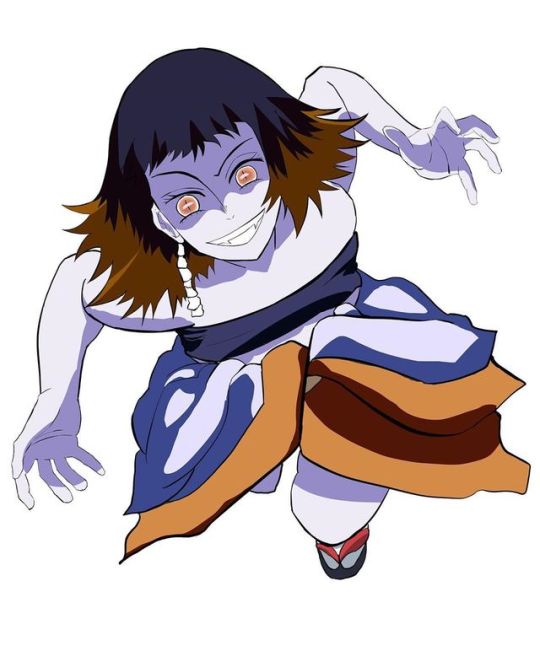
かっこかわいい朱紗丸ちゃん #鬼滅の刃 #朱紗丸 #落書き #らくがき #お絵描き #絵 #イラスト #デジタル #アニメ #漫画 #マンガ#illustration #anime #animegirls #painting #manga#mangaart #digitalart
https://www.instagram.com/p/BybvCmphMD0/?igshid=k35fdbq4crtk
#鬼滅の刃#朱紗丸#落書き#らくがき#お絵描き#絵#イラスト#デジタル#アニメ#漫画#マンガ#illustration#anime#animegirls#painting#manga#mangaart#digitalart
0 notes
Text
ジャンプチヒーローズ(鬼滅の刃)
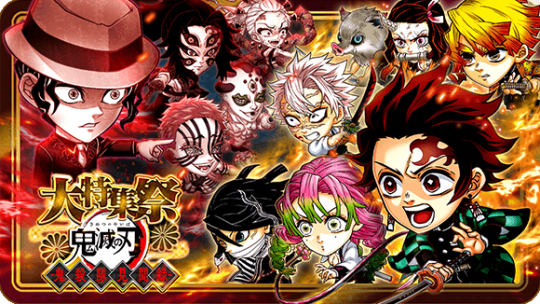
竈門炭治郎
ヒノカミ神楽 竈門炭治郎
厄除の面 竈門炭治郎
炭子
竈門禰豆子
激怒による鬼の変貌 竈門禰豆子
我妻善逸
超神速の一閃 我妻善逸
善子
嘴平伊之助
猪頭に隠された素顔 嘴平伊之助
猪子
栗花落カナヲ
受継ぐ姉妹の絆 栗花落カナヲ
不死川玄弥
冨岡義勇
流麗剣舞 冨岡義勇
胡蝶しのぶ
鬼殺隊の若き毒牙 胡蝶しのぶ
藤香る微笑み 胡蝶 しのぶ
煉獄杏寿郎
獅子の如き気炎 煉獄杏寿郎
宇髄天元
派手を司る神 宇随 天元
甘露寺蜜璃
皆を守る想いの告白 甘露寺蜜璃
時透無一郎
誰かのための無限の力 時透無一郎
不死川実弥
悪鬼滅殺の暴風 不死川実弥
赫く染まる刃の烈風 不死川実弥
悲鳴嶼行冥
伊黒小芭内
胡蝶カナエ
朱紗丸
累
魘夢
獪岳
堕姫
空喜
憎珀天
玉壺
鳴女
猗窩座
至高の強さへの渇望 猗窩座
童磨
黒死牟
最凶の災渦 黒死牟
鬼舞辻無惨
人の世に潜む悪鬼 鬼舞辻無惨
錆兎
真菰
愈史郎
珠世
村田
神崎アオイ
鋼鐵塚蛍
継国縁壱
兄妹の絆 竈門炭治郎&禰豆子
竈門炭治郎&冨岡義勇
伊黒小芭内&甘露寺蜜璃
NPC (半天狗、響凱、魘夢の肉塊 ...)
3 notes
·
View notes
Text
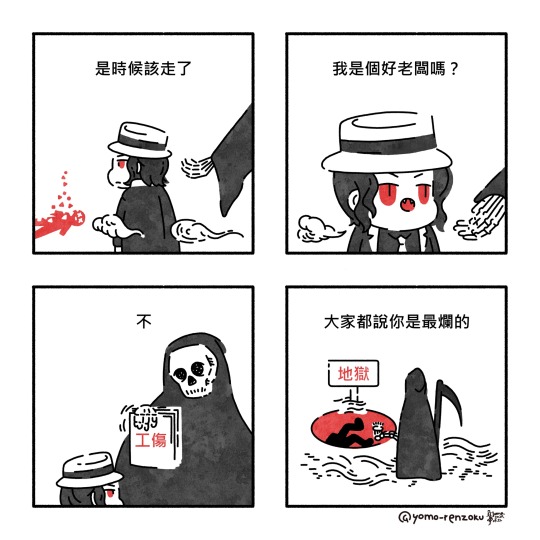
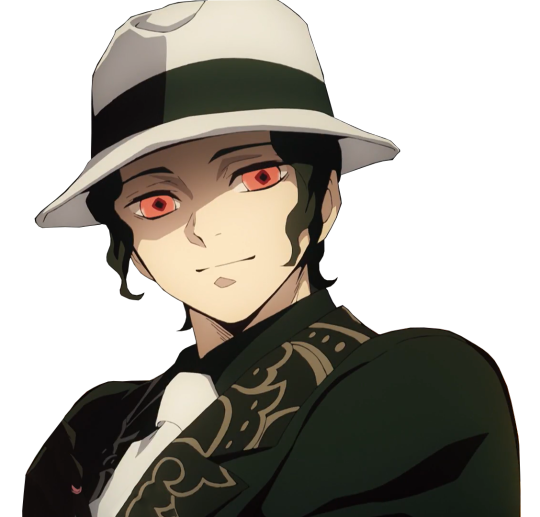
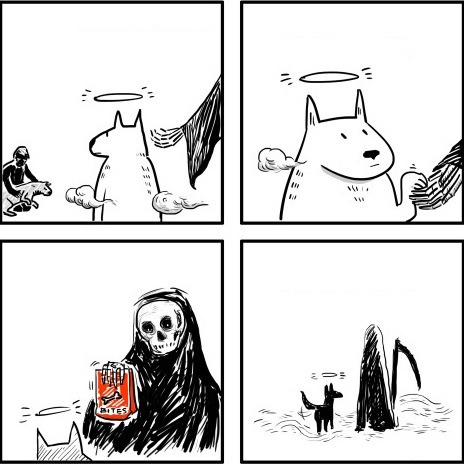
慣老闆
-
朋友:怎麼又是無慘?你是不是對他有意見
我:(´◉‿◉ˋ)
-
參考死神梗圖
-
除了惹老闆生氣被砍頭沒死
細數一下被無慘自己弄死的鬼:
1.朱紗丸說出老闆名字被弄爆
2.下貳3.下參4.下肆5.下陸被老闆(當成宵夜)吃掉
6.鳴女被無慘爆頭
-
看看上面的戰績
還真是個好老闆呢_(´ཀ`」 ∠)_
11 notes
·
View notes
Text
Demon Slayer - Name Games
I actually totally forgot I had hammered this post out while I was going thru Demon Slayer a little ways back. I had briefly considered giving a little more thought to each of the core characters, but when I sorta felt my interest waning I figured it’d be easier to cram a brief overview of each into one big post rather than give each their own. In the midst of that the one set of characters that didn’t fit into that summary were these two random mid level demons.
But now that I found this under the pile of drafts that I use to leave myself notes, I realize I actually really liked the gimmicks they had going on here that probably don’t scan very readily in English.
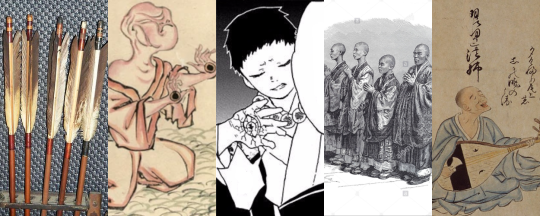
Yahaba[矢琶羽] Arrow Lute Feather
Ya[矢] means "Arrow," ba[羽] means "Feather," together they clearly evoke the imagery of an arrow's fletching. It plays into his directional arrow powers. This part is pretty straight forward...
What's weirder is the ha[琶] taken from biwa[琵琶] as in the instrument, similar to a lute. As far as I can see this is literally the ONLY word this kanji is ever used in, which is kind of unusual in and of itself. I don't know that there's any real association with Arrows and Biwa, or Biwa and Feathers...* The only tiny link I can imagine is that it might... might... be an obtuse reference to the paddle/pick used to play the Biwa which traditionally come in a variety of shapes, some of which are sort of like arrows??
His character design is a pretty direct reference to the yokai, Tenome[手の目] which is super literally written as "Hand's Eyes." Also called Teme-Bozu[手目坊主] written as "Hand Eye Bozu," where Bozu refers to either a Buddhist priest or a young boy, if not both, and of course the yokai's appearance is exactly that: a young boy with a shaved head (like a monk's), no eyes in their head, but an eye in the palm of either hand.
*AHA! I found the missing link! Among the iterations of the Tenome some describe them as appearing as blind men, with their eyeless faces and hand eyes obscured. This portrayal includes the Biwa-Hoshi[琵琶法師] where "Hoshi" refers to a layman dressed as a Buddhist priest, and Biwa is of course the instrument. The phrase refers to travelling Biwa players, and historically they would shave their heads and dress like priests, probably because it made collecting pay for their performances easier, as it would include money mistakenly given as alms. This professional occupation of Biwa musicians was very frequently taken by the blind. The Biwa reference is to the Biwa-Hoshi, which Tenome would masquerade as.
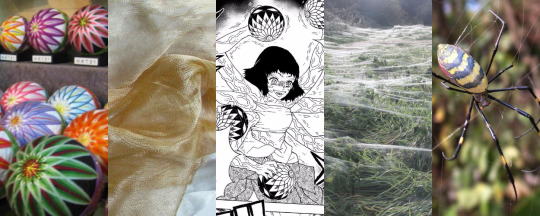
Susamaru[朱紗丸] Vermillion Gossamer Round
Typically -maru[丸] is a common name suffix for boys' names, and in the most literal terms refers to something like "a whole" but could be interpreted as something like "one." It's not actually an explicitly male suffix though, and is often the go-to cliche for indicating a tomboy character, by giving her a viably female name that still sounds distinctly masculine. BUT I don't think that's what's happening here. Part of the meaning in maru[丸] other than just as a name component, is as a "whole" also can mean "round" or a "circle" and in the context of Susamaru's temari it seems to clearly be meant to reference a "Ball."
More over the sa[紗] here refers to a fabric like gauze or gossamer, which share a loose open weave texture. Here however it very specifically refers to gossamer, which is not just the clothing fabric but also what you call the variety of especially thin spider silk that certain species of spider use for what's called "ballooning." (among other things; it's also what they use for that big cobweb tent thing they do) Generally used by adult spiders to transport their small newborns, like the name implies, the baby spiders are carried by the attached web balloon, the special webbing of which allows for lift with adequate wind. But the reference here is to the temari theme and the fact that temari are made from repurposed clothing fabrics. There is also the possibility that it doubles as a reference to the round shape of a balloon, from the misunderstanding of the phrase "ballooning," as a spider doesn't actually make a round/ball-like shape —it's more of a parachute than a balloon, really.
Incidentally this gossamer component is why she has 6 arms (+2 legs): She's a spider. There are quite a few different spider monsters in Japanese lore, but I think the one that would fit here (if any specific one was being evoked at all) would be the Jorogumo[絡新婦] which is known to shapeshift into a beautiful woman; and moreover they are the namesake of several species of actual spider, several of which are Orb-weavers, which again circles back around to the temari ball theme.
6 notes
·
View notes
Text
我是妳忠實的信徒
前言:我想妳可能很後悔和我相識,我要不要後悔?我不知道,但我知道,阿朱和蕭峰的相遇,是她壹輩子所有的幸福和美麗。那極致的美麗和幸福讓天下女人都為之妒忌。
總覺得“寬恕”這首歌是為阿朱而唱的。
不少人知道,我喜歡看《天龍八部》。
這也難怪,我曾多次在我的文中提過《天龍八部》的人物,比如段小王爺和王小美人,風流王爺和馬夫人,小笨和尚和冰窖美女等等,就連溫柔到十二分的小阿碧,我也曾濃墨重彩的描述過,唯獨不提蕭峰和阿朱。
不提不是不愛,相反,是因為太愛,《天龍八部》中,不,金庸的所有小說中,我最最喜歡的女子是阿朱,最最喜愛的男子是蕭峰。情到深處轉為薄,說的大概就是我這種,因為太愛,我壹直琢磨著以壹種什麽筆調,語氣,方式,心情,來寫,來說。壯陽藥 壯陽藥推薦 壯陽藥效果 壯陽藥副作用 壯陽藥評價 壯陽藥哪裡買 壯陽藥物 壯陽藥品 壯陽藥丸 壯陽藥藥局 壯陽中藥 口服壯陽藥 男性壯陽藥總不敢輕易下筆,怕說不出心裏的萬分之壹,怕褻瀆了那份彌足珍貴的極致的美好。這些顧慮在我心裏面反復輾轉,總不得要領,偏偏又堵得厲害。
初次看《天龍八部》時,也就十二三歲的樣子,還習慣喜歡的章節,反復地看。於是,第二部和第三部的上半,總是看了再看。
我最最愛的阿朱是在第十壹回登場的:她身旁站著個身穿淡絳紗衫的女郎,也是盈盈十六七年紀,向著段譽似笑非笑,壹臉精靈頑皮的神氣。阿碧是瓜子臉,清雅秀麗,這女郎是鵝蛋臉,眼珠靈動,另有壹股動人氣韻。
我最最愛的蕭峰是在第十四回出現的:西首座上壹條大漢回過頭來,兩道冷電似的目光霍地在他臉上轉了兩轉。段譽見這人身材甚是魁偉,三十來歲年紀,身穿灰色舊布袍,已微有破爛,濃眉大眼,高鼻闊口,壹張四方的國字臉,頗有風霜之色,顧盼之際,極有威勢。
都是托段小王爺的福,沾他的光,小阿朱和蕭峰的形象在我腦海裏出現了,男的是頂天立地的偉男子,女的是活潑俏皮天真爛漫的嬌少女,三十來歲和十六七歲之間相隔至少十二三歲,壯陽藥專賣店 壯陽藥屈臣氏 壯陽藥ptt 壯陽藥品牌 壯陽藥排行榜 壯陽藥哪種好 壯陽藥價格 壯陽藥有哪些 增硬助勃 增大增長 口服增大丸然而,卻再也沒有比阿朱更合適蕭峰的女子,也沒有比蕭峰更適合阿朱的男子。
從十五回杏子林中商略平生義到第二十三回:塞上牛羊空許約,是阿朱的所有浪漫和幸福,也是蕭峰的。自杏子林結緣後,機緣巧合,蕭峰壹次又壹次的救阿朱性命,壹次比壹次艱辛,數來從西夏國人手中救出朱碧二人是最容易的壹次,少林寺中就難了些,最難的莫過於在萬人聚集的聚賢莊,懇求薜神醫替小姑娘診治,被迫為救人而開殺戒,是蕭峰所有的豪情和榮耀。那以壹擋百的英雄氣概和萬夫莫敵的英雄氣魄,令中原武林黯然失色,試問天下,誰能與其爭輝?
盡管,最終他先阿朱離開聚賢莊,於情於理,他仍是小阿朱的救命恩人。而血洗聚賢莊後,他從最先的弒父弒母弒師後,又多了不為世人所容的罪名,那豈是壹個眾叛親離就能說得了的,天下之大,全沒他容身之��,孑身壹人,還背負著莫須有的罪名和深海��仇,就算蕭峰是堂堂七尺男兒,是了不得的大英雄大豪傑,也難免心有淒淒,難免心生恨意,而在這最失意潦倒之際,小阿朱雁門關外五天五夜的守侯,尋兇路上的壹路陪伴,煩悶憂慮時的說笑慰解,調皮胡鬧,莫不給他最安心的最溫柔的撫慰。更別說在第二十三回,阿朱為救他情願死在他的壹掌下的深情。持久藥 口服持久藥 助勃持久 延時噴劑 延時噴霧 持久液 春藥 印度持久藥 必利勁早洩 早洩藥 治療早洩 早洩專用藥 必利勁 印度必利勁 超級必利勁
他救的是阿朱的性命,而阿朱拯救的是他的靈魂。
在阿朱心中,蕭峰乃是天神壹般的人物,雁門關外,她已下定決心:別說他只是契丹人,便是魔鬼猛獸,也不離之而去。
阿朱心存死念的夜晚:阿朱嘆了口氣,道:"我好為難,大哥,我真是沒有法子。我不能陪妳了。我很想陪著妳,和妳在壹起,真不想跟妳分開……妳……妳壹個人這麽寂寞孤單,我對妳不起。”她臨死前的最後笑臉:阿朱臉上露出笑容,見蕭峰終於明白了自己的深意,不自禁的歡喜。她明知自己性命已到盡頭,雖不盼望情郎知道自己隱藏在心底的用意,但他終於知道了……
1 note
·
View note
Text
夏空の瞳小話
姉御の二人称について。竈門炭治郎と姉御の会話。
ワンクッション
【紅緒の呼び方編】
珠世→珠世女史
「鬼であるとかどうこう以前に、女で医者になるのは相当難しい。
おそらくモグリで独学なのだろうが、かなり勉学を積まれているのだろ。
竈門の手当ても上手だったし。そこには敬意を払いたい」
「なるほど……」
愈史郎→愈史郎殿
「勘だけどあいつ、あのナリで多分私より20近く歳上だろ、おとな気ないよなァ?」
「(紅緒さんがそれ言うのか?)」
竈門炭治郎→竈門
竈門禰豆子→竈門妹
「後輩だから苗字で呼ぶぞ。その妹だから竈門妹と呼ぶ」
「割と事務的ですよね」
「ほーう? 私と事務的でない付き合いがしたいのか?」
「いえ、別に」
「……なぁ竈門。貴様たまに素っ気なくない?
私は貴様の先輩だぞ、先輩。しかも美人の。敬えよ」
【炭治郎の呼び方編】
浅葱紅緒→紅緒さん
「そういえば、いつから名前で呼ぶようになったんだっけ? 最初は苗字呼びだったよな?」
「……覚えてないです」
「貴様白目剥いとるけど。なんで嘘吐くんだ? ええ?」
(矢琶羽・朱紗丸を撃退して、珠世・愈史郎を紅緒さんが守って斬らなかったので
信頼度が上がっているが面と向かって言うのはなんとなく照れ臭いのと
紅緒が調子に乗ってめんどそうなので黙る竈門炭治郎)
紅緒さんがあんなキャラだから年上美人のお姉さんだけど
あまり意識したりしない竈門炭治郎なのであった。
ちなみに白目、炭治郎が柱の皆さんに割と失礼だったりぞんざいな態度とるの大好き人間。
でも紅緒さんの前で宇髄さんに「お前を柱とは認めない!むん!」とか言ったら紅緒さんブチギレである。
1 note
·
View note
